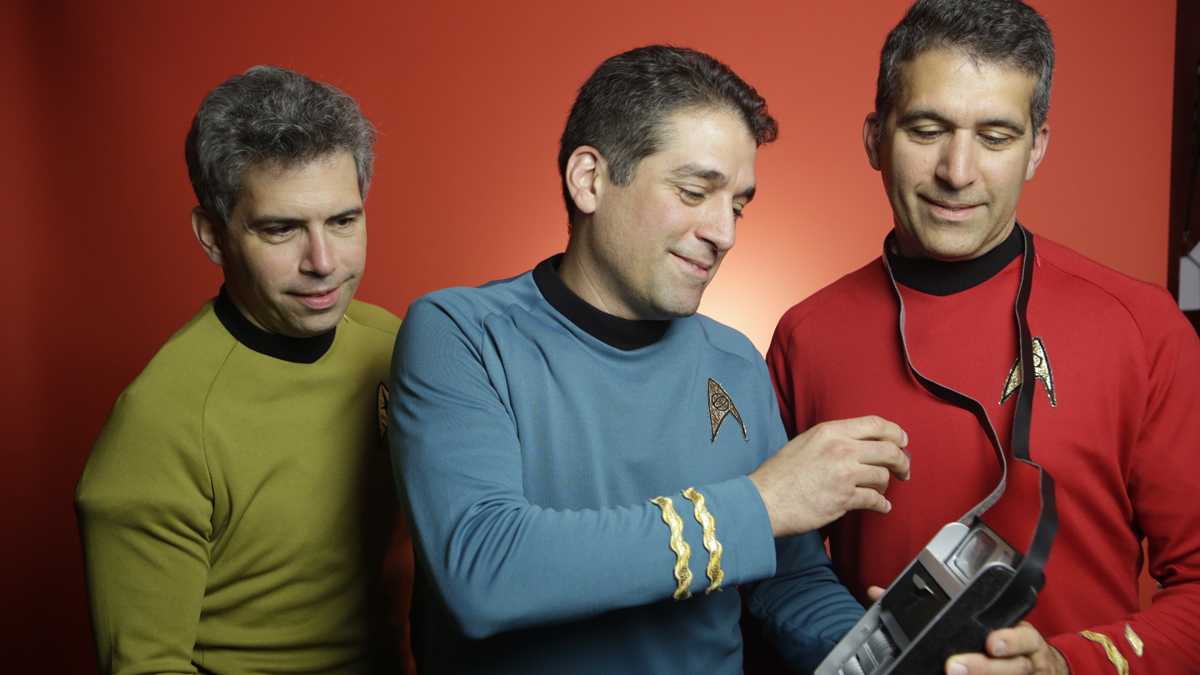Underdogs win cash to make ‘Star Trek’ device a reality
Listen
Members of the Final Frontier Medical Devices team geeked out in Star Trek gear, with the fictional device that inspired the Qualcomm Tricorder XPRIZE. From left: brothers George, Basil and Gus Harris. (Not pictured: Phil Charron, Julia Harris, Andy Singer and Ed Hepler.) (Photo courtesy of XPRIZE)
Qualcomm Tricorder XPRIZE inventors built a 21st-century medical device that can diagnose dozens of diseases from the palm of your hand.
The challenge was to build a “Star Trek”–inspired ‘tricorder’ — a medical device that can diagnose dozens of diseases from the palm of your hand.
In April, Final Frontier Medical Devices was one of two teams left standing in the multimillion-dollar Qualcomm Tricorder XPRIZE Competition.
In one corner was a team of heavyweight researchers from Harvard University. That team had backing from a major phone manufacturer and the Taiwanese government.
The unlikely contenders were an emergency room doctor, three of his siblings, a childhood friend, and a retired engineer. They spent late nights talking and planning over a kitchen table in the Philadelphia suburbs, and they invested lots of their own cash to make it all work.
Lankenau Medical Center ER physician Basil Harris is the captain of the underdog crew. Leading up to the XPRIZE final, The Washington Post called the match up “a Basil and Goliath story.”
“I see the comparison,” Harris said a few days before the big announcement ceremony in Hollywood. “We are a little scrappy startup, and we’re proud of our small and mighty status.”
Their device, called DxtER, is a tablet connected to several 3D-printed gizmos that can measure vital signs. That information, plus a medical history, is enough for DxtER to diagnose a long list of concerns, including sleep apnea, tuberculosis, and urinary tract infection.
The announcement event included the son of the creator of “Star Trek,” and even the guy who played the doctor on the ’90s spinoff, “Star Trek: Voyager.”
Harris and company took the stage and stood across from the other team. Harris wore a casual suit instead of his usual scrubs, and in the corner there was a huge cardboard check.
Final Frontier won the top prize. All told, the team took home just over $3 million.
“I never thought I’d be standing up here like this. This has been an incredible journey,” Harris said at the ceremony. “The revolution in health care starts here.”
Some of the prize money will pay for lab time so the team can do more research and development. There’s also a deal to put DxtER in Lowe’s hardware stores across the country, if and when the device wins government approval.
Harris says there’s still a long way to go. Getting the device to market will take years.
In the meantime, there was a brief hero’s welcome back home in Philadelphia, where about 50 supporters gathered. As guests mingled, a friend of the team volunteered to try out DxtER.
She has a chronic health condition and often has to check her blood sugar, which requires a needle prick. But DxtER can read blood glucose via infrared light.
The volunteer put her hand into a glove connected to the device, which works like the fingertip pulse oximeters that hospitals use.
“Oh boy, now we’re getting a real test,” Harris said.
“Feels like nothing,” the volunteer said.
In the head to head comparison with a traditional blood glucose meter, DxtER came up with roughly the same result. It passed the test.
“An equally important part of our competition, beyond how well the technologies made their diagnoses, was how well people like them,” said Tricorder XPRIZE Medical Director Erik Viirre.
That’s a key part of why Final Frontier won: They made the diagnostic process more pleasant, and they focused on patient-user experience.
With the XPRISE brand as a launch platform, the Final Frontier team is morphing into a full-on company called Basil Leaf Technologies.
XPRIZE is the same competition that once birthed commercial space flight technologies and inspired better efficiency in electric cars. Viirre has similar hopes for the “tricorder” innovation.
“The term tricorder has now turned from something used in a science fiction TV show to something that is part of the common parlance,” Viirre says.
Harris says his dream is to create something affordable for people.”Devices like this tricorder in the hands of regular consumers give them the information that they need, reliable medical data, reliable information that they can use to make decisions.”
So what’s next? After Final Frontier gets the big check, Harris and company have some decisions to make. There’s investment to pursue, partnerships to ink, and clinical trials to finish.
Harris isn’t quitting his emergency room day job just yet, but he’s optimistic about what lies ahead. Someday that thing that made its first appearance as science fiction in the ’60s could be a very real part of your medicine cabinet.
WHYY is your source for fact-based, in-depth journalism and information. As a nonprofit organization, we rely on financial support from readers like you. Please give today.



